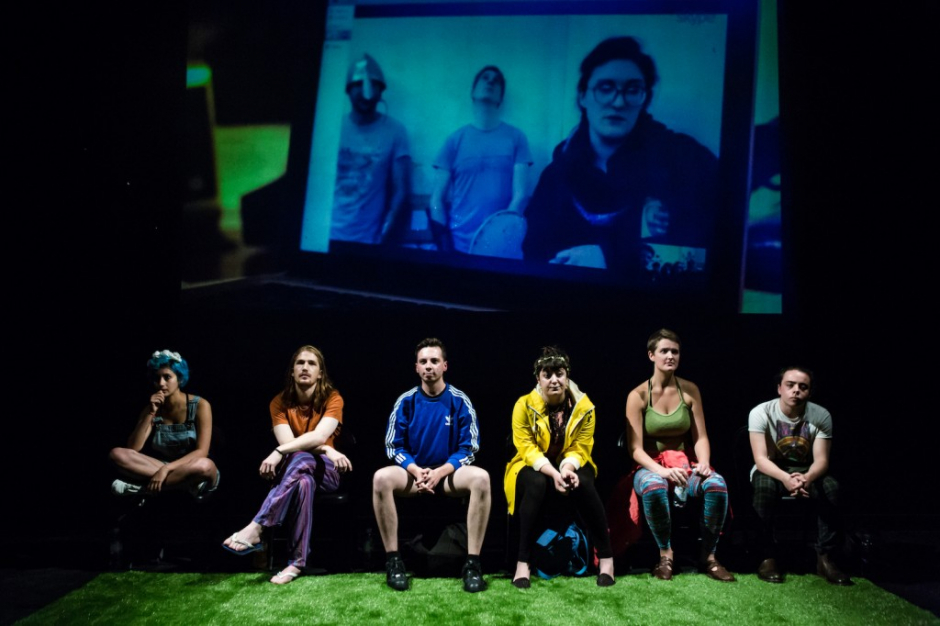The Beanfield, April 2 2016
Have you heard of the Battle of the Beanfield? I don’t mind admitting that, until last night, it wasn’t something that I was aware of. Some of you will be agreeing with me, I’m sure; while others, those who do know about the terrible events that unfolded in a field near Stonehenge on June 1st 1985, will be shaking their heads at my ignorance. And so they should. Because after seeing this fifty minute long play/re-enactment/documentary in HOME’s intimate Theatre 2 last night, I believe it is almost criminal that this isn’t a universally known incident.
So let me give you the basics. On the aforementioned date, 537 travellers were making their way to the annual Stonehenge festival to basically have a bit of a boogie, enjoy some food and booze, and stay up all night being the peaceful fun lovers that they were. There were children there. Teenagers. Infants. Toddlers. Babies. There were men and women of all ages, from the elderly and all the way down. Due to a High Court injunction issued at the behest of the National Trust and English Heritage they were met by 1,300 police officers and military members from all over the country. What followed may be known by some as the Battle of the Beanfield, but the Beating of the Beanfield might be more appropriate.
Those 537 unarmed travellers (remember the teenagers, the infants, the toddlers, the babies) were not just apprehended on their way to the festival. They were beaten. Badly. Their motor homes were torched. Families were separated, and not just for that day. The repercussions would continue for years. Although not for the police and the military, of course. None of them would ever be charged.
A happy story, right? No. Definitely not a happy story. So it may come as a bit of a surprise that Breach Theatre decide to represent it as, at least in part, a comedy. Drawing constant parallels between today’s often misrepresented youth and the unfortunate people involved in the Beanfield, this Warwick based theatre company pack the dramatised elements of the show with some very contemporary humour. Visiting Stonehenge for the 2015 Summer Solstice, we meet a group of friends who are faking their way through life, enjoying the drugs they are offered, and enduring endless pointless conversations with people they couldn’t care less about. It’s an amusing and adroit counteract to the parts of the show that deal directly with the Beanfield, but it also raises some interesting questions about life for the current generation. While the travellers from 1985 were attacked by a Thatcher policy backed mob in the Beanfield, are their equivalents in today’s society being manhandled just as badly but in different ways?
As intriguing and subtle as these dramatised sections are, this play really comes to life in its more documentary-style sections. As well as staging their own re-enactment in the Beanfield, the Breach Theatre brigade also conducted a series of interviews with those involved in the fateful day. Those on both sides of the argument are interviewed and the conclusion seems to be the same; this was nothing less than an atrocity. Each interviewee is asked if they believe that the police and military involved in the incident still think about it every day. Most of them doubt it. But, in perhaps the most powerful moment of the whole production, it becomes clear that one of the victims from that day will never forget the things she saw when they truncheons came out.
Choosing to mix the comedic contemporary elements with the filmed interview footage turns out to be a masterstroke. As humorous contemporary criticism mixes with hard-hitting accounts of a shameful day in British history, it is difficult not to get sucked into a kind of emotional crescendo. This feeling is only exacerbated by the brilliant closing scenes, with the strobe lighting and the fighting and the wildly wielded cricket bat. What we’re left with is an incredibly well-crafted tale on many different media. A brave and brilliant production that brings attention to something we should never have forgotten.
Fran Slater

